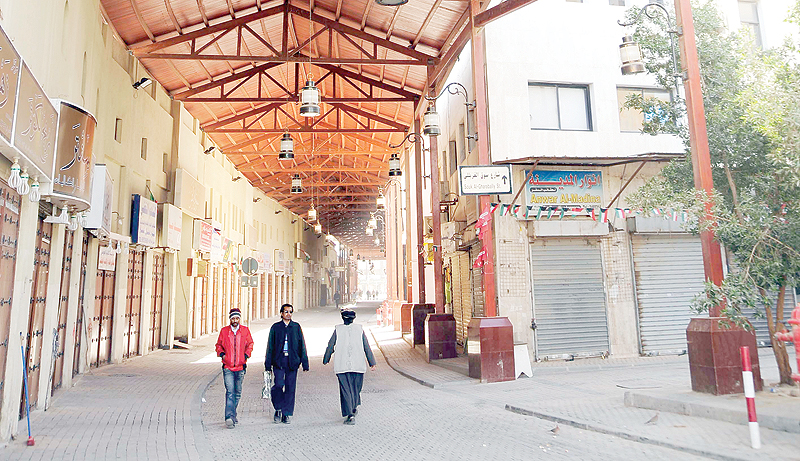Long-time owners protest new investor's 'inflated rent' demands
KUWAIT: Many shops in Souq Mubarakiya are facing the possibility of shutting down after the investor in the market - Real Estate House - demanded a huge rise in rent, which in many cases reached 1,000 percent. The investor acquired the rights to Souq Mubarakiya after beating 17 other companies with a bid of KD 3.671 million per year. According to the management of Real Estate House, this figure was submitted based on a feasibility study of the rents in the area.
Real Estate House signed contracts with 64 percent of the total of 529 shops in Souq Mubarakiya, while the remaining 36 percent rejected the inflated rents and went to court to pay the old rent. The investor signed the contract on March 1, 2017 and is collecting the new rent since then. It said the old contracts with the previous company have expired and it has final verdicts from the supreme court.

Eviction orders
More than 10 of the shops that are paying rent at the court recently lost their case, and are now facing eviction orders. This led the shop owners to down their shutters on Friday in protest against the improbable increase in rent values. Abu Mohammed, owner of a mobile phone accessory shop, explained his objection to Kuwait Times, saying he has been running his shop for over 20 years. "My earlier rent, which I'm currently paying to the court, is KD 413 a month, which is suitable for my small business. The new investor demanded KD 4,500, which is over a 1,000-percent increase, and I couldn't accept it. During the best and busiest days, I make KD 50 maximum, so how can I pay that rent," he asked.
Abu Mohammed believes that the new investor wants to get rid of them and wants to replace these shops with trendy restaurants or other businesses. "I tried to resolve the problem with the investor and reach some compromise, but they completely refused to cooperate. Instead they proposed unrealistic conditions, saying I have to pay the full amount of KD 4,500 per month retroactively for the past period and they won't give me a receipt for that payment. In addition, they told me that all the rent I paid at the court for the past almost two years won't be deducted from this payment," Abu Mohammed said.
"And even if I agreed to these unreasonable conditions, they still will submit my shop to a committee which has to agree that I sign an investment contract for only three years. This contract does not protect the investor (me). So we went on strike as all the negotiations were unsuccessful," he added.
The investment contract of the earlier investor of Souq Mubarakiya (Kuwait Commercial Market Complex Company) with the ministry of finance expired in 2015. "Although their contract already expired, that company still received rent from us in 2015, 2016 and 2017, and also increased it by 300 percent. They also signed contracts with us that are valid till 2020 for some shops," concluded Abu Mohammed.
Ammar is the owner of Waleema Restaurant, one of those paying at the court who didn't sign the contract with the new investor. He is also running his restaurant in the souq for over 20 years. "I don't know what will happen with my restaurant if I lose my case at the court. My previous rent was KD 600 with the yard in front of the restaurant. The new investor demanded a rent of KD 6,000 and without the yard too. We hope that somebody will help us," he said.
Violations committed
Anwar Al-Qinaei is the spokesman of the 36 percent of the shops that are paying at the court. According to him, the new investor committed some violations. "According to the contract signed by the new investor with the ministry of finance, he should collect the rents starting from June 1, 2018, when the effective date of the contract starts after one year of its validity from June 1, 2017. But he started collecting from the date he signed the contract, which is 15 months in advance," he pointed out.
"When the objecting shops filed a case at the court against the unreasonable rent in 2017, all our cases where rejected, and the verdict was that these cases were filed in advance, as the contract was not yet effective. This means he has no right to collect the rent from us. The investor was also renting the parking lot in this period and didn't pay that amount to the ministry of finance," Qinaei said.
"The new investor refused to receive the rent from us claiming there is no relation with us, as we are illegally occupying the shops. And he refused to receive the payment from the court. But we discovered that a few months earlier, he received it, which is an indirect declaration of him of the rental relation between us," explained Qinaei.
Attorney Mubarak Mijzea commented that there is no maximum limit of increase for commercial contracts. "It's not the same as residential contracts that cap the maximum increase at 100 percent. The investor has the right to raise the rent according to the prevailing rent in similar locations. The shops that are paying at the court can demand a property expert to evaluate the rent value, who will decide the suitable rent increase. The investor set the high prices in the bid after he calculated the new increased rents," he said.
By Nawara Fattahova




